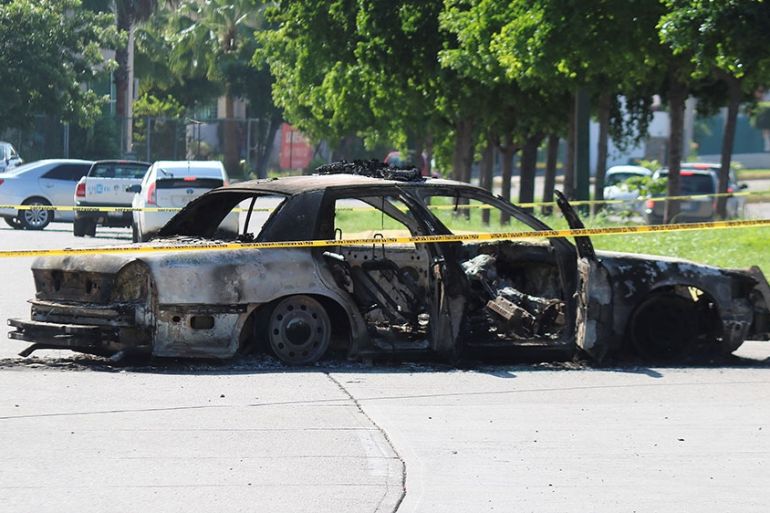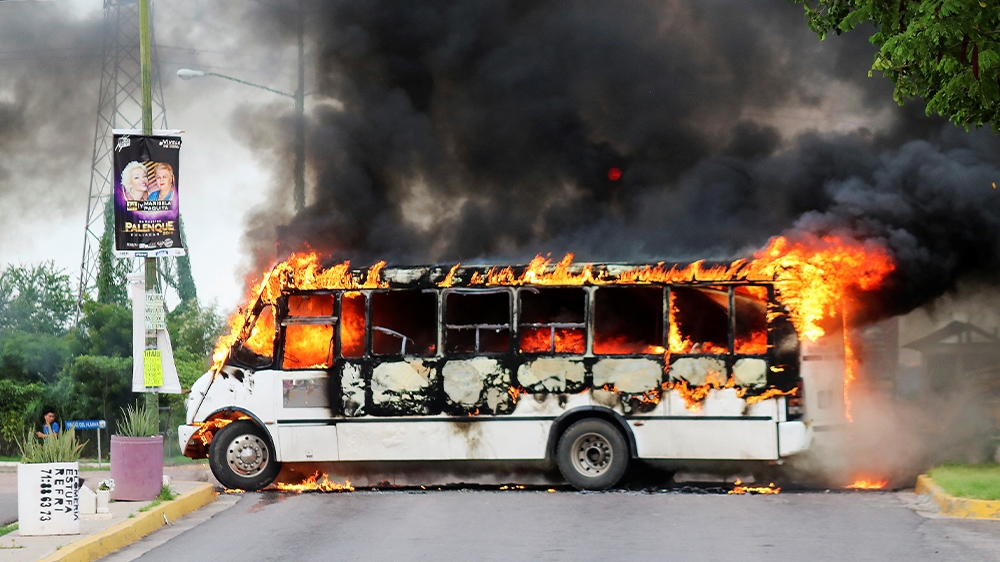Backlash over Mexico’s botched attempt to arrest ‘El Chapo’s’ son
Armed men overpowered security forces on Thursday prompting them to release the son of drug lord ‘El Chapo’ Guzman.

The Mexican government sought to defuse mounting criticism on Friday, a day after the capture and abrupt release of the son of drug lord Joaquin “El Chapo” Guzman, triggered intense gun battles in the streets, paralysing a major city.
On Thursday, armed men in the city of Culiacan, a stronghold of the Sinaloa Cartel, unleashed heavy gunfire on security forces, taking several of them hostage after they detained Ovidio Guzman – prompting security forces to release him.
Keep reading
list of 4 itemsWhat to know about Chinese Olympic swimmers’ doping scandal
West Africa’s Sahel becoming a drug trafficking corridor, UN warns
Behind India’s Manipur conflict: A tale of drugs, armed groups and politics
The violence spread across the city of 750,000 people as the cartel deployed fighters, burned vehicles and blockaded streets. Schools were shut for the day and residents were told to stay inside.
Amid the chaos, dozens of inmates escaped from the city’s prison.
Video of the events, which played out in broad daylight, were widely shared on social media. They showed terrified residents taking cover beside vehicles amid hails of gunfire and heavily armed men blocking streets against plumes of black smoke filling the sky.
President Andres Manuel Lopez Obrador in his daily news conference on Friday said the decision to release Guzman, was taken in order to save lives.
“This decision was made to protect citizens,” Lopez Obrador said.
“The situation became very difficult, and many citizens, many people, many human beings were at risk,” he said. “You can’t fight fire with fire.”
Officials said eight people were killed in the gun battles, including five suspected gunmen.

The botched arrest and the unrest it ensued drew accusations against the government of Lopez Obrador that it lacked a coherent security strategy and had surrendered to cartel violence.
“The take away from all this is that the Mexican government and the military was effectively forced into submission by criminal organizations,” said Falko Ernst a Mexico researcher with the Crisis Group.
“It sets a dangerous precedent,” Ernst said.
Ovidio Guzman, 28, became cartel leader after his father, considered one of Latin America’s most powerful drug kingpins, was extradited to the United States in 2017.
According to the government’s official account, Ovidio Guzman was temporarily detained on Thursday in a house by 30 troops. Following a violent response from the cartel, security forces released Guzman and withdrew from the house, officials said.
Public security secretary Alfonso Durazo said that eight troops and one army officer were briefly held hostage by gunmen and were freed in exchange for Guzman.
Defence Minister Luis Sandoval, in a news conference in Culiacan, admitted that the operation had been poorly planned.
“The task force acted hastily, the consequences were not considered, the riskiest part wasn’t taken into account,” Sandoval said.
“It was a badly planned strategy,” he said.

Jaime Lopez-Aranda, a Mexico City-based security analyst said that what made the problem far worse, was the fact that the failed operation happened in public, almost in real time.
“It was a gigantic screw-up,” Lopez Aranda said.
He added that it also demonstrated that the administration of Lopez Obrador lacks a coherent and decisive strategy on cartel violence in the country.
“It shows that they have zero operational accountability, knowledge or responsibility,” he said.
The left-wing Lopez Obrador however, has criticised previous administrations’ policies of using heavy military force to crack down on gang activity, saying it killed too many people and has failed to end criminal violence in the country.
During his campaign, he famously promised to be the president of “hugs, not bullets”, and bring peace to Mexico after decades of surging criminal rates.
He rejected accusations that his government had acted weakly in releasing Guzman.
“That’s the difference with this strategy compared with what previous governments have done. We don’t want deaths, we don’t want war,” he said.
“The capture of a criminal cannot be worth more than people’s lives.”
And yet, the murder rates in Mexico this year are on track to surpass those of last year’s, of more than 29,000.